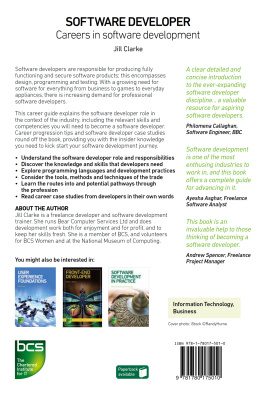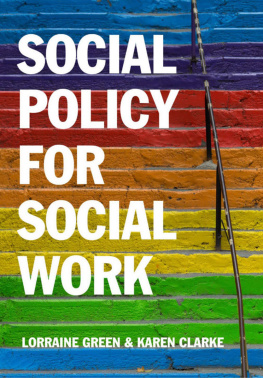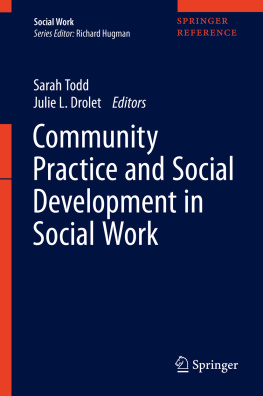SOCIAL WORK AS COMMUNITY DEVELOPMENT
To Terrie
Social Work as Community Development
A management model for social change
Second Edition
Stephen Clarke
Centre for Applied Social Science
University of Wales Swansea
First published 1996 by Ashgate Publishing
Reissued 2018 by Routledge
2 Park Square, Milton Park, Abingdon, Oxon OX14 4RN
711 Third Avenue, New York, NY 10017, USA
Routledge is an imprint of the Taylor & Francis Group, an informa business
Copyright Stephen Clarke 1996, 2000
All rights reserved. No part of this book may be reprinted or reproduced or utilised in any form or by any electronic, mechanical, or other means, now known or hereafter invented, including photocopying and recording, or in any information storage or retrieval system, without permission in writing from the publishers.
Notice:
Product or corporate names may be trademarks or registered trademarks, and are used only for identification and explanation without intent to infringe.
Publisher's Note
The publisher has gone to great lengths to ensure the quality of this reprint but points out that some imperfections in the original copies may be apparent.
Disclaimer
The publisher has made every effort to trace copyright holders and welcomes correspondence from those they have been unable to contact.
A Library of Congress record exists under LC control number: 99075451
ISBN 13: 978-1-138-72814-1 (hbk)
ISBN 13: 978-1-315-19064-8 (ebk)
I am concerned to provide some more detail to the model which was first described in the First Edition. Testing out the format on students and in the field highlighted the need to provide an additional framework through which the template could be applied to the practice situation. The inclusion of a descriptive section on systems theory in helps make up for that shortfall.
It appears that the philosophy which is central to community development is beginning to make a comeback in the developed economies of Europe, and in the U.K. managers and the framers of policy are beginning to seek a mechanism for putting flesh on their public claims for involving the community in schemes as far apart as making public institutions more transparent in their activities to regenerating the heart-lands of the inner city. Professionals in the field can only welcome this turn of events, and hope that it may finally come out of the shadows and become a regular feature of public service agencies, and voluntary effort alike.
There are dangers and traps for the unwary in this potential upturn in fortunes. In a resource-conscious and post-modernist age, quick-fix solutions and window dressing may over-dramatise the potential of community development to solve the pressing problems of the day. It is for this reason, that the contemporary interest in getting 'value for money', and a growing professional interest is the application of evaluations techniques at home which have been a feature of 'overseas' development for years, is very welcome. The application of the template approach to the logic framework evaluation process will prove beneficial to those attempting to discover how the social change processes of community development affect people and organisational formations at different levels in the community.
In the production of this volume, I owe a great debt to Terrie McCarthy, who manages to come to the rescue when the production processes are becoming too much. To Ann Meadows, whom I acknowledged in die first edition, I must again express my thanks for the early ideas from which this enterprise arose. Most of all, I again acknowledge the inspiration to the people with whom I have worked on the ground, both in the U.K. and in many other parts of the world. Pillgwenlly, South Wales and Riverlea, South Africa, stand out, particularly as their situations reveal that there might still be a need there for the type of work which we describe here.
The students of the University of Wales Swansea endure it all with good humour, and they continue to provide the impetus for revising, and I hope, improving this approach to social change, people in general, and the professional responsibilities of intervening in the dynamics of community life.
Steve Clarke
Swansea, 2000
This volume is an attempt to re-open the discussion concerning the development potential of social work within Britain, a Northern and developed economy. The questions are, can and should social welfare professionals direct their energies and take responsibility for planned social change strategies, especially in the light of the new social policies surrounding Community Care? Along with community nurses, social workers are among the few public officials who are paid to deploy in the community on a fulltime basis - in face-to-face contact with ordinary people, in their own homes, with an agenda of social welfare. They are in a unique, and virtually monopolistic position to consider, plan and act on matters which they, themselves, have identified as their vocational priority - the alleviation of social deprivation, and the creation of a less violent and alienated society. It would be ludicrous to suggest that social workers could achieve this all on their own, with the meagre resources at their disposal. However, they are in daily contact with the only untapped force in the social-democratic system the citizen. Why is it then, that they are not actively seeking ways to forge alliances with the one asset which they have at their disposal? On the contrary, they appear to shy away from them, except as objects of assessment and prescription. In so doing, they are demonstrating just how out of touch they are. British social work is the only institution of its kind in Europe which consigns community to the sidelines. At the same time, they anguish about their own future, and the seemingly insuperable problems with which they contend. Social workers have no natural allies of their own, and they are steadfast in refusing to make any. We hope that this volume will shed a little light on the way in which this position can be reversed.
In Britain, the debate whether or not social work and community development were part of the same profession, was over almost before it had begun. It took place over thirty years ago, but so much has changed in the interim, that it is time that some of the issues were looked at afresh. In the 1970's, both 'sides' retreated in the face of the hostility of the other. Today, few bother to consider whether or not there is even a question worth asking, yet alone differences worth resolving. The social work and community development professions hardly acknowledge the existence of the other. There is virtually no cross-over between the 'Youth and Community Work' training (which is where community development does get some cursory treatment), and the Diploma in Social Work qualifying programme (where it gets virtually none). Even then, the situation is not helped, because restrictive demarcation agreements mean that the respective skills and insights of the two professions are rarely accessible to the other at the work face.
This situation has arisen out of three strands of history and tradition which have conspired to keep the practitioners of each section firmly apart, and, seemingly, deliberately, blind to the advantages that each might offer the other. The primary reason for this hiatus arose when the disparate wings of British social work attempted to form one, unified professional organisation, the British Association of Social Workers (BASW). This movement began in the 1960's. Leading figures in the social work 'wing' gave strong signals that 'community work' had an important part to play in the emerging 'generic', Social Services Departments, which arrived in 1970. Dame Eileen Younghusband, doyenne of the profession, and Sir Frederic Seebohm, who had been charged with the re-structuring of the social services, both gave prominence to the 'development' dimension in their writings on the future of social work (Seebohm, 1968; Younghusband, 1959). Government policies at the beginning of the 1970's indicated that there was a place for community intervention in their vision of the future (Plowden, 1966; Seebohm, 1968; Skeffington, 1969; Youth Service Development Council, 1969), and all seemed set fair. Nevertheless, the fates were against it.









